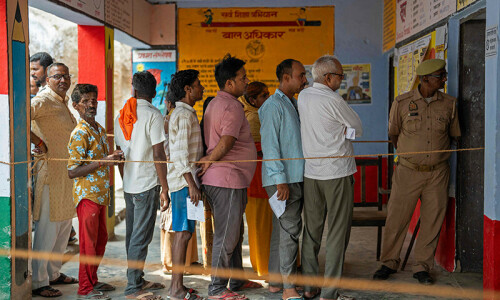NEW DELHI: Thousands of women farmers held sit-ins and a hunger strike in India’s capital on Monday in protests on International Women’s Day against new agricultural laws.
The demonstrations were held at multiple sites on the fringes of New Delhi where tens of thousands of farmers have camped for more than three months to protest against the laws they say will leave them poorer and at the mercy of big corporations. Prime Minister Narendra Modi’s government says the laws are necessary to modernise agriculture.
About 100 women wearing yellow and green scarfs sat cross-legged in front of a makeshift stage in Ghazipur, one of the many protest sites. Holding the flags of farm unions, they listened to female farm leaders speak from the stage and chanted slogans against the laws. At least 17 took part in a day-long hunger strike.
Women are sitting here, out in the open, in protest, but Modi doesn’t care. He doesn’t care about mothers, sisters, and daughters. He doesn’t care about women. That’s clear, said Mandeep Kaur, a female farmer who traveled 1,100 kilometers (680 miles) from Chhattisgarh state to participate in the protests.
Multiple rounds of talks between the government and farmers have failed to end the stalemate. The farmers have rejected an offer from the government to put the laws on hold for 18 months, saying they wont settle for anything less than a complete repeal. They fear the laws will make family-owned farms unviable, eventually leaving them landless.
Women have been at the forefront of the protests, which have posed one of the biggest challenges to Modi since he took office in 2014. Many accompanied thousands of male farmers who arrived at the protest sites in late November and have since organized and led protest marches, run medical camps and massive soup kitchens that feed thousands, and raised demands for gender equality.
Today Modi is sending wishes to women across the country on International Women’s Day. Who are these women he is sending wishes to? We are also like his daughters, but he clearly doesn’t care about us, said Babli Singh, a farm leader.
International Women’s Day, sponsored by the United Nations since 1975, celebrates women’s achievements and aims to further their rights.
Women often embody what agricultural experts call an invisible workforce on India’s vast farmlands that often goes unnoticed.
Nearly 75pc of rural women in India who work full-time are farmers, according to the anti-poverty group Oxfam India, and the numbers are expected to rise as more men migrate to cities for jobs. Yet, less than 13pc of women own the land they till.
Published in Dawn, March 9th, 2021














































